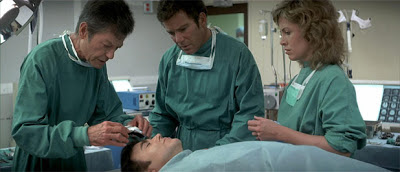Genetic Testing for Cancer Risk
Thursday, January 10, 2013
Disclaimer: Medical information you want to use for anything other than casual table talk with your friends should always be found through reliable medical sources (not blogs) and discussed with your own doctor. I get my information from reliable sources, including my docs and reputable online sources like the Mayo Clinic and others, but this info changes over time, so the following may be out-of-date when you read it. It may be totally incorrect info for your particular case. Check with your doctor if you have questions. Cancer treatment improves over time, so data is variable and ever-improving. Your mileage may vary.
So....
For the past two years, my oncologist has been trying to get me to have the BRCA test done. That's the genetic mutation test for familial breast cancer. I've resisted for three reasons:
1) For twenty years, my breast cancer has been assumed by him and other physicians to have been caused by my radiation treatments for Hodgkins Disease. (Breast cancer in up to 30% of female Hodgkins survivors is reported, for those who had mantle radiation treatment when I did in the late 80s.)
2) I have no history of breast cancer in my family.
3) They're already watching me closely for breast cancer, because of both my radiation exposure and having had breast cancer, so what would be the difference in my healthcare if the test were positive?
We talked about it again at my annual checkup in December. He said one could never be sure of the cause of a breast cancer, and I was very young (25) when I had it, which is a risk factor for the BRCA mutation. In the regular population, the incidence of breast cancer is 12%. If you have the mutation, it is up to 80%. Many women elect to have preventative mastectomy, and the surveillance is actually more rigorous than what I am doing.
Additionally, there is increased ovarian cancer risk (from less than 1% in the general population to up to 44% with the BRCA mutation). I would have my ovaries removed in a New York minute, if I knew I had that risk.
I finally decided to do it. It's odd that I didn't want to do the test as soon as it was offered to me, because I am a very scientifically-minded person. If there is information I can get about my own health, I want it. Plus, this is life and death stuff, not insignificant. Why wouldn't I do it?
Because I was scared to death that I might have the mutation.
I just decided that, like any of the myriad diagnostic procedures I've had in my lifetime, having the test does not change the facts, it only reveals them. The situation is what it is, and you are better off knowing than not knowing, so you can fight your illness (or significant chance of one) armed with knowledge. Also, Dr. L pointed out that if the test showed I didn't have the mutation, it would be quite a load off my mind.
He forgets that until he mentioned it a few years ago, it wasn't a concern to me at all. Thanks, Doc!
A few days later, I met with the nurse practitioner who does genetic counseling and prepares the samples for the lab. While we were going through every detail of my family members' health, all the way back to my great-grandparents, she discovered a pattern that actually indicated a greater likelihood of another genetic issue in our family, called Lynch Syndrome. I have several relatives on my mom's side of the family with cancers of the brain, kidney and uterus, and many with colon polyps, which are benign but can sometimes be associated with colon cancer.
If you have Lynch Syndrome, your risk of colon cancer is up to 82%, compared to the general population's risk of 2%. Uterine cancer- up to 71% compared to 1.5% of the general population. You are also at increased risk of cancers of the stomach, ovaries, urinary tract, breast, brain, small bowel and pancreas. This is why it is sometimes called Cancer Family Syndrome.
So the nurse ordered up the Lynch Syndrome test as well. Why not. If I'm going to be sweating a test, I may as well sweat two. The only other genetic test available was one for melanoma, which is probably the only cancer my mom's family doesn't have.
I just got the results of both, and they were... negative! Whee!
One of the things cancer survivors deal with is having many medical tests for the rest of their lives. They may be part of your regular follow-up. You may have a symptom a little out-of-the-norm that wouldn't be a concern for the general population, but they want to "be cautious" and do an MRI or other diagnostic tests.
I've had a lot of unpleasant and/or worrisome tests and biopsies over the years, after which I waited anxiously for what ended up being negative results, but I will take a hundred nerve-wracking negative tests over one positive. Heck, I'm happy to be alive to have those tests at all. I'm thankful we've got the technology and knowledge we have.
Still waiting for the tricorder that they just wave over you for diagnosis and treatment.
 |
| He's dead, Jim. |





0 comments:
Post a Comment